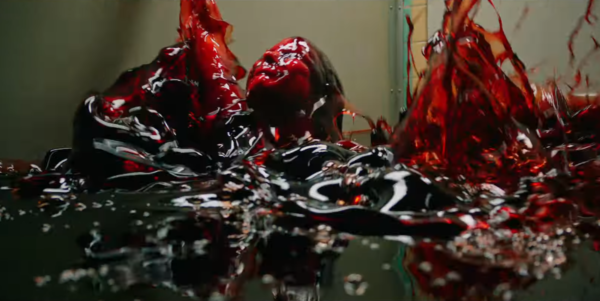It Chapter Two, 2019.
Directed by Andy Muschietti.
Starring James McAvoy, Jessica Chastain, Bill Skargard, Bill Hader, Isaiah Mustafa, Jay Ryan, James Ransone, Andy Bean, Teach Grant, Jaeden Martell, Jeremy Ray Taylor, Sophia Lillis, Finn Wolfhard, Chosen Jacobs, Jack Dylan Grazer, Wyatt Oleff, and Nicholas Hamilton.

SYNOPSIS:
27 years after the Loser’s Club stopped Pennywise’s reign of terror over Derry, they’ve all but forgotten that fateful summer. But now Pennywise has resurfaced and is plaguing the town once again, the Losers have to remember their past and put an end to IT once and for all.

After the first film debuted with rip-roaring success, it was always going to be intriguing to see how Andy Muschietti and Gary Dauberman adapt the adult portion of Stephen King’s classic horror in IT: Chapter Two. Thankfully, they’ve done so with horrific flair. Like much of King’s work, the film easily has plenty to say about the monstrosity of humanity – and it’s never more prevalent than in the opening’s brutal homophobic attack on Adrian Mellon and his boyfriend. And although it’s Pennywise that provides the shock and gore, the beating is given by several small-minded Derry bullies. It immediately sets an uneasy tone for the 169-minute runtime. From there, it’s a grizzly journey that isn’t afraid to dish out buckets of blood.
Once the Loser’s Club are called back to Derry by Mike Hanlon (Isaiah Mustafa), it all feels a little too formulaic as it gives the audience an insight into their lives alongside how they’ve been shaken to their core from their first encounter with Pennywise. Whether it’s Bill’s (James McAvoy) internal guilt, Beverly Marsh (Jessica Chastain) and her abusive marriage, Eddie’s hypochondria, Ben’s unhappiness or Richie Tozer’s (Bill Hader) unwillingness to open up. Obviously the groundwork for their stories came in the first film, but IT: Chapter Two wholeheartedly develops the Losers in surprising ways while thoroughly exploring their adult personalities. The only element of the film that slightly hinders its brilliance is a minor sub-plot involving Henry Bowers – the psychopathic bully from IT: Chapter One. It pushes the boundary of the film’s already extensive run-time (which in itself isn’t a complaint) but it doesn’t quite have the emotional weight needed to make his inclusion memorable alongside the Losers and Pennywise.
But, Director Andy Muschietti once again masterfully balances the humour and lightness of these beautifully human characters with the encroaching terror of Pennywise as he infects the town itself. Since these characters (and the cast portraying them) have such incredible chemistry, it’s easy to get sucked into their individual stories and forget that they’re being stalked by Pennywise with his number of unspeakable horrors. Once the audience is lulled into a sense of safety, it isn’t too long before the rug is pulled from underneath and we’re faced with bloody monsters, zombies and psychopaths. Each jump-scare acts like a well-placed lightning bolt. Thankfully, the film plays with some of the stereotypical scares that a seasoned horror fan could spot a mile away, and manipulates this with much success. Even if the payoff is expected, the jumps work because audiences already know the context of these characters and what they’re truly terrified of.

The special effects of all the nightmarish creations that are flung to life are also terrifyingly impressive. One sequence in particular during the return to the house on Neibolt Street is so startling as the gang are forced to face their own united guilt and grief. The manner in which Muschietti and Cinematographer Checco Varese execute a creepy scuttling monstrosity will leave audiences watching the dark corners of their rooms for days afterwards. Something else that will swirl around audience’s brains – is Benjamin Wallfisch’s eerily haunting score. The tender keys of ’27 Years Later’ inspire a poetic sense of impending doom, and he expertly helps create the atmosphere throughout.
The stand-out performance (aside from Bill Skarsgard as Pennywise, of course) undeniably comes from Bill Hader’s Richie Tozer. His one-line quips and banter with the Losers (mainly hypochondriac Eddie) are truly hilarious, but as his own secrets weigh down on him, he struggles to come to terms with it – even when Pennywise forces him to confront his internal struggle head-on. Good guy, that Pennywise, helping adults deal with their own childhood trauma and leave their pasts behind. Seriously though, the film has plenty to say about growing up, leaving home and acknowledging the past. Maybe it relies a little too heavily on the first film for it’s context, but thanks to the brilliantly gripping young cast, it’s hard to complain at their appearances scattered throughout.

It Chapter Two feels like a ghastly vision of an ’80s family adventure – there’s a definite Spielberg undertone in places. After all, at it’s essence, this is a film about facing your fears, overcoming adversity and discrimination to live comfortably in your own skin. It just happens to use a murderous clown as it’s method of getting the message across. Speaking of the Clown Prince of Horror, Bill Skarsgard as Pennywise is once again truly disturbing. His euphoric reign of terror is so undoubtedly unsettling throughout that it’s hard to relax whenever he’s onscreen. Perhaps it’s the clown’s unpredictability combined with that sinister smile, regardless – Skarsgard’s monstrous performance is second to none, and cements his villain as a modern classic.
A fantastically chilling thrill-ride that knowingly hides a tender heart, lulling you into a sense of safety before rattling you to your core.
Flickering Myth Rating – Film: ★ ★ ★ ★ / Movie: ★ ★ ★ ★
Eammon Jacobs











